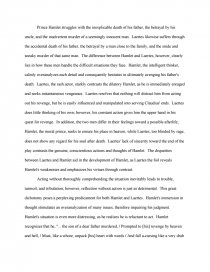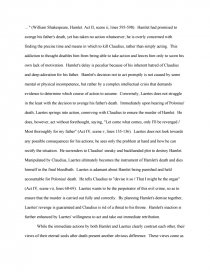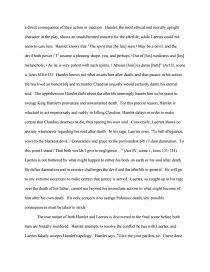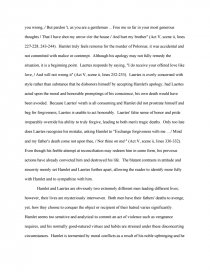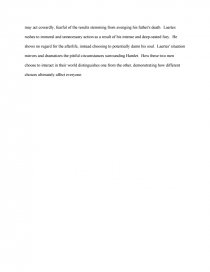Hamlet And Laertes
Essay by 24 • April 26, 2011 • 1,542 Words (7 Pages) • 1,236 Views
Prince Hamlet struggles with the inexplicable death of his father, the betrayal by his uncle, and the inadvertent murder of a seemingly innocent man. Laertes likewise suffers through the accidental death of his father, the betrayal by a man close to the family, and the snide and sneaky murder of that same man. The difference between Hamlet and Laertes, however, clearly lies in how these men handle the difficult situations they face. Hamlet, the intelligent thinker, calmly overanalyzes each detail and consequently hesitates in ultimately avenging his father's death. Laertes, the rash actor, starkly contrasts the dilatory Hamlet, as he is immediately enraged and seeks instantaneous vengeance. Laertes resolves that nothing will distract him from acting out his revenge, but he is easily influenced and manipulated into serving Claudius' ends. Laertes does little thinking of his own; however, his constant action gives him the upper hand in his quest for revenge. In addition, the two men differ in their feelings toward a possible afterlife; Hamlet, the moral prince, seeks to ensure his place in heaven, while Laertes, too blinded by rage, does not show any regard for his soul after death. Laertes' lack of sincerity toward the end of the play contrasts the genuine, conscientious actions and thoughts of Hamlet. The disparities between Laertes and Hamlet aid in the development of Hamlet, as Laertes the foil reveals Hamlet's weaknesses and emphasizes his virtues through contrast.
Acting without thoroughly comprehending the situation inevitably leads to trouble, turmoil, and tribulation; however, reflection without action is just as detrimental. This great dichotomy poses a perplexing predicament for both Hamlet and Laertes. Hamlet's immersion in thought stimulates an overanalyzation of many issues, therefore impairing his judgment. Hamlet's situation is even more distressing, as he realizes he is reluctant to act. Hamlet recognizes that he, "... the son of a dear father murdered, / Prompted to [his] revenge by heaven and hell, / Must, like a whore, unpack [his] heart with words / And fall a-cursing like a very drab ... " (William Shakespeare, Hamlet. Act II, scene ii, lines 595-598). Hamlet had promised to avenge his father's death, yet has taken no action whatsoever; he is overly concerned with finding the precise time and means in which to kill Claudius, rather than simply acting. This addiction to thought disables him from being able to take action and leaves him only to scorn his own lack of motivation. Hamlet's delay is peculiar because of his inherent hatred of Claudius and deep adoration for his father. Hamlet's decision not to act promptly is not caused by some mental or physical incompetence, but rather by a complex intellectual crisis that demands evidence to determine which course of action to assume. Conversely, Laertes does not struggle in the least with the decision to avenge his father's death. Immediately upon hearing of Polonius' death, Laertes springs into action, conniving with Claudius to ensure the murder of Hamlet. He does, however, act without forethought, saying, "Let come what comes, only I'll be revenged / Most thoroughly for my father" (Act IV, scene v, lines 135-136). Laertes does not look towards any possible consequences for his actions; he sees only the problem at hand and how he can rectify the situation. He surrenders to Claudius' sneaky and backhanded plot to destroy Hamlet. Manipulated by Claudius, Laertes ultimately becomes the instrument of Hamlet's death and dies himself in the final bloodbath. Laertes is adamant about Hamlet being punished and held accountable for Polonius' death. He tells Claudius to "devise it so / That I might be the organ" (Act IV, scene vii, lines 68-69). Laertes wants to be the perpetrator of this evil crime, so as to ensure that the murder is carried out fully and correctly. By planning Hamlet's demise together, Laertes' revenge is guaranteed and Claudius is rid of a threat to his throne. Hamlet's inaction is further enhanced by Laertes' willingness to act and take out immediate retribution.
While the immediate actions by both Hamlet and Laertes clearly contrast each other, their views of their eternal souls after death present another obvious difference. These views come as a direct consequence of their action or inaction. Hamlet, the most ethical and morally upright character in the play, shows an unadulterated concern for the afterlife, while Laertes could not seem to care less. Hamlet knows that "The spirit that [he has] seen / May be a devil, and the devil hath power / T' assume a pleasing shape, yea, and perhaps / Out of [his] weakness and [his] melancholy, / As he is very potent with such spirits, / Abuses [him] to damn [him]" (Act II, scene ii, lines 610-615). Hamlet knows not what awaits him after death, and thus pauses in his action. He has lived an honest life and to murder Claudius unjustly would certainly damn his eternal soul. The apprehension Hamlet feels about the afterlife seemingly haunts him in his quest to avenge King Hamlet's premature and unwarranted death. For this precise reason, Hamlet is reluctant to act impetuously and rashly in killing Claudius; Hamlet delays in order to make certain that Claudius deserves to die, thus sparing his own soul. Conversely, Laertes shows no anxiety whatsoever regarding his soul after death. In his rage, Laertes cries, "To hell allegiance,
...
...
